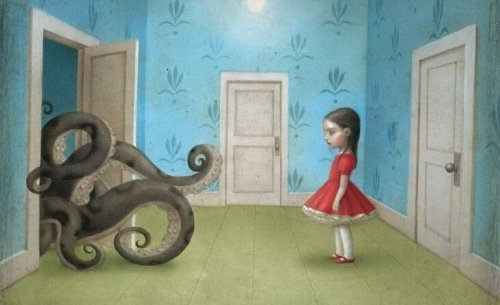Toxic Children: Adults Aren't the Only Ones

Children often rebel at home and do not want to listen or respect the rules. However, some children cause very serious problems for their parents. The parents are overwhelmed and run-down from their children’s behavior. When the parent-child relationship is deteriorating, we might have a case of toxic children, otherwise known as tyrants.
In this case, the home becomes a hostile environment. The parents start to sweat buckets as soon as their foot is in the door. They know that a demanding and hostile tyrant waits for them inside. A child who will try to make them do what he wants. The more that the parents try to take control, the more defensive the child becomes.
“A child without limits ends up becoming a tyrant.”
How to recognize toxic children
It’s important not to confuse toxic children with those who display age-appropriate behavior and behavior that results from a completely normal rebelliousness. There is some behavior which, when examined closely, must be nipped in the bud. After all, limits are necessary to avoid raising your children to be tyrannical. In this sense, it is important to have flexible limits in place. Flexible, but at some point become firm.
One attitude that parents should set boundaries for is defiance. This is when children challenge their parents and try to get them to engage in their aggressive and hostile game. Breaking the rules, non-compliance with punishments and avoiding chores are warning signs to watch out for.

It is also important to keep your eyes peeled for any sign of the child trying to order one of his parents around. If the child throws a tantrum when he isn’t allowed to watch TV or eat whenever he wants, nip that behavior in the bud at the very first sign. Other warning signs that we shouldn’t ignore are pickiness, lack of empathy towards others, a low tolerance for frustration and a tendency to try to manipulate others to get what they want.
If you have to bribe your child to get her to do something, you are spoiling her.
Toxic children are the product of an unsatisfactory upbringing. They are pampered and spoiled. They have no limits, the parents give in to blackmail and allow them to wield power that they are neither old enough nor mature enough to handle. Parents have the power and children try to take it and win their independence. In this space of tension, many parents fail because they feel incapable of dealing with it. They give up and the work goes from difficult to very complicated. Instead of a kg of energy, the task requires a ton.
Parents are often the cause
As harsh as it sounds, most of the time parents cause their children’s toxicity. Spoiling them, being overprotective, not establishing limits, trying to be their friend, and not spending quality time with them can have devastating results.
However, there is a solution to all of this. The solution is more complicated than before. It requires greater intelligence and often the help of a competent professional. This person can help the parents re-establish limits and develop strategies to enforce them. The limits should be appropriate to the specific situation, taking into account the child’s maturity and directed towards concrete behavior.

In this way, the parents will begin to establish clear and consistent limits that cannot be questioned or ignored. It’s important not to use prizes to encourage the child to follow the rules. Instead, use social recognition to reinforce the positive behavior.
Trying to use gifts or prizes with your teen could open the door to a new kind of manipulative behavior. In this case, she would only respect the rules when there is a prior promise of some kind of payoff. They have to learn that there doesn’t always have to be some kind of external motivation for their behavior. Often, the benefit of good behavior is in being able to carry it out. It’s just like when you help someone and it makes you feel useful. It is a difficult feeling to intuit or explain, the best thing is for the child to experience it herself.
Without a doubt, it is indispensable to focus on the positive and improve communication with children displaying this type of behavior. Good communication will help us understand the root causes of their attitude. Maybe they feel hurt because we are not around, and their behavior is a way to punish our absence. Let’s try to communicate with them and understand them… understanding is not the same as being indulgent.
“I’m not bad. Listen to me and you will see that underneath my bad behavior is a need”.
-Anonymous-
The most important thing to keep in mind when dealing with toxic children is not to lose control. We get so caught up in our responsibilities and worries that we overlook our children’s needs. They are crying for affection, care, and quality time. When they behave badly to get our attention or as a result of poor parenting, what do we do? We punish them even more by arguing and blaming. Or we go to the other extreme and reinforce the behavior by giving them what they want.

We must not avoid the demanding (and also fascinating) challenges of raising a child. With love and patience, we will be in a position to do away with the toxicity that affects so many children when they have more power than they should. They will want it, but our job is to keep it, no matter how tired we are from work or how much we’d like to avoid a tantrum. The outcome of these types of struggles is what determines the kinds of arguments we will have with them when they become teenagers.
Children often rebel at home and do not want to listen or respect the rules. However, some children cause very serious problems for their parents. The parents are overwhelmed and run-down from their children’s behavior. When the parent-child relationship is deteriorating, we might have a case of toxic children, otherwise known as tyrants.
In this case, the home becomes a hostile environment. The parents start to sweat buckets as soon as their foot is in the door. They know that a demanding and hostile tyrant waits for them inside. A child who will try to make them do what he wants. The more that the parents try to take control, the more defensive the child becomes.
“A child without limits ends up becoming a tyrant.”
How to recognize toxic children
It’s important not to confuse toxic children with those who display age-appropriate behavior and behavior that results from a completely normal rebelliousness. There is some behavior which, when examined closely, must be nipped in the bud. After all, limits are necessary to avoid raising your children to be tyrannical. In this sense, it is important to have flexible limits in place. Flexible, but at some point become firm.
One attitude that parents should set boundaries for is defiance. This is when children challenge their parents and try to get them to engage in their aggressive and hostile game. Breaking the rules, non-compliance with punishments and avoiding chores are warning signs to watch out for.

It is also important to keep your eyes peeled for any sign of the child trying to order one of his parents around. If the child throws a tantrum when he isn’t allowed to watch TV or eat whenever he wants, nip that behavior in the bud at the very first sign. Other warning signs that we shouldn’t ignore are pickiness, lack of empathy towards others, a low tolerance for frustration and a tendency to try to manipulate others to get what they want.
If you have to bribe your child to get her to do something, you are spoiling her.
Toxic children are the product of an unsatisfactory upbringing. They are pampered and spoiled. They have no limits, the parents give in to blackmail and allow them to wield power that they are neither old enough nor mature enough to handle. Parents have the power and children try to take it and win their independence. In this space of tension, many parents fail because they feel incapable of dealing with it. They give up and the work goes from difficult to very complicated. Instead of a kg of energy, the task requires a ton.
Parents are often the cause
As harsh as it sounds, most of the time parents cause their children’s toxicity. Spoiling them, being overprotective, not establishing limits, trying to be their friend, and not spending quality time with them can have devastating results.
However, there is a solution to all of this. The solution is more complicated than before. It requires greater intelligence and often the help of a competent professional. This person can help the parents re-establish limits and develop strategies to enforce them. The limits should be appropriate to the specific situation, taking into account the child’s maturity and directed towards concrete behavior.

In this way, the parents will begin to establish clear and consistent limits that cannot be questioned or ignored. It’s important not to use prizes to encourage the child to follow the rules. Instead, use social recognition to reinforce the positive behavior.
Trying to use gifts or prizes with your teen could open the door to a new kind of manipulative behavior. In this case, she would only respect the rules when there is a prior promise of some kind of payoff. They have to learn that there doesn’t always have to be some kind of external motivation for their behavior. Often, the benefit of good behavior is in being able to carry it out. It’s just like when you help someone and it makes you feel useful. It is a difficult feeling to intuit or explain, the best thing is for the child to experience it herself.
Without a doubt, it is indispensable to focus on the positive and improve communication with children displaying this type of behavior. Good communication will help us understand the root causes of their attitude. Maybe they feel hurt because we are not around, and their behavior is a way to punish our absence. Let’s try to communicate with them and understand them… understanding is not the same as being indulgent.
“I’m not bad. Listen to me and you will see that underneath my bad behavior is a need”.
-Anonymous-
The most important thing to keep in mind when dealing with toxic children is not to lose control. We get so caught up in our responsibilities and worries that we overlook our children’s needs. They are crying for affection, care, and quality time. When they behave badly to get our attention or as a result of poor parenting, what do we do? We punish them even more by arguing and blaming. Or we go to the other extreme and reinforce the behavior by giving them what they want.

We must not avoid the demanding (and also fascinating) challenges of raising a child. With love and patience, we will be in a position to do away with the toxicity that affects so many children when they have more power than they should. They will want it, but our job is to keep it, no matter how tired we are from work or how much we’d like to avoid a tantrum. The outcome of these types of struggles is what determines the kinds of arguments we will have with them when they become teenagers.
This text is provided for informational purposes only and does not replace consultation with a professional. If in doubt, consult your specialist.







